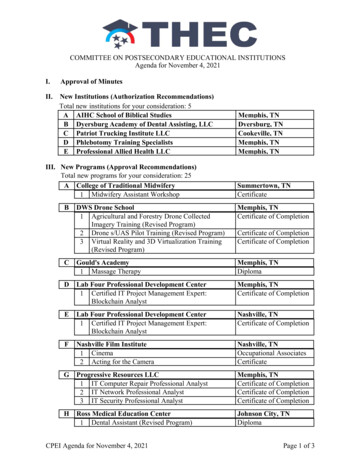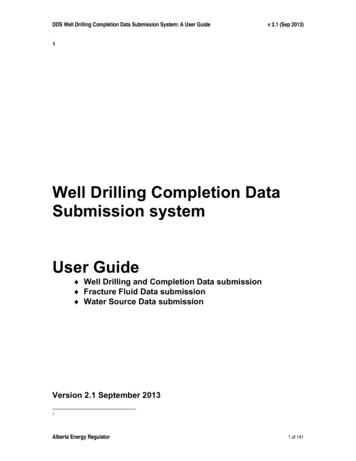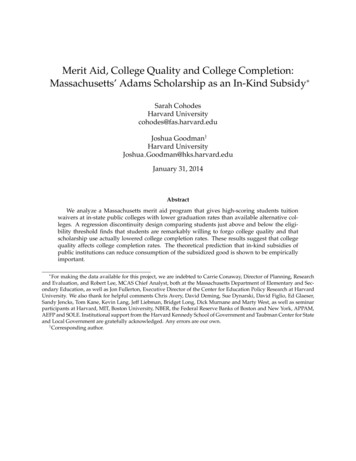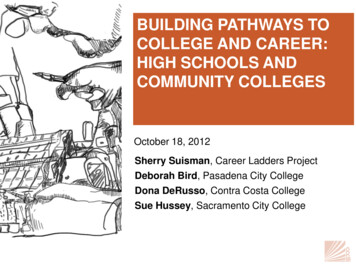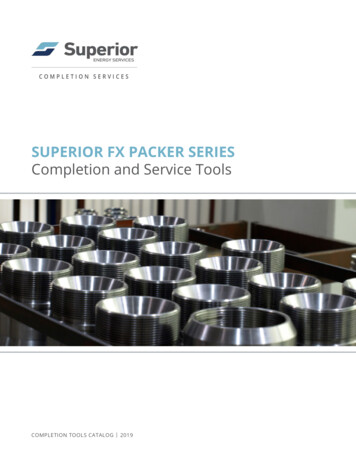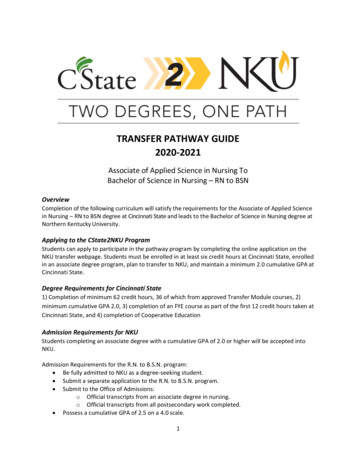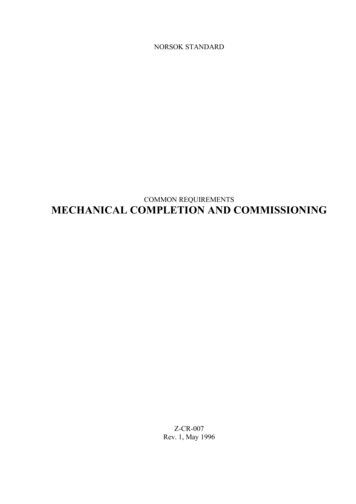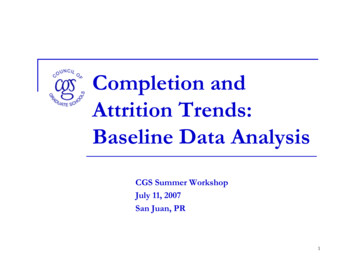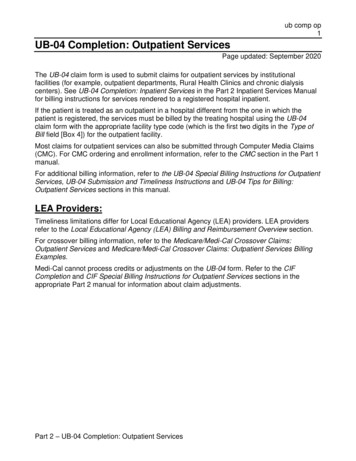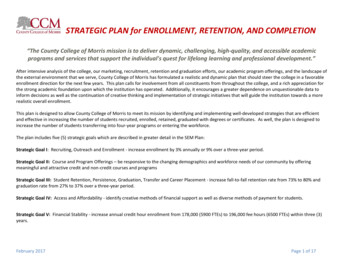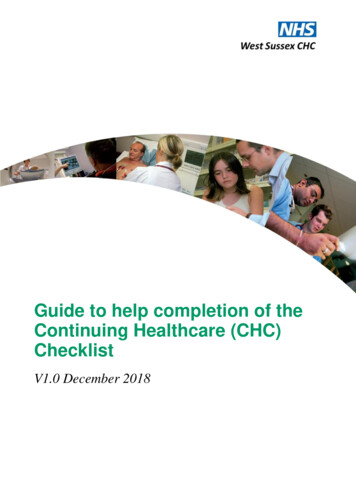
Transcription
Guide to help completion of theContinuing Healthcare (CHC)ChecklistV1.0 December 2018
Help to complete the CHC ChecklistThis leaflet has been designed as a guide to assist you with completing the West Sussex CHCChecklist.Please ensure the consent is completed and information is provided within each of theChecklist domains. Please do not use abbreviations.Please note this is not exhaustive. If you require additional assistance please use the contact detailson the back of this leaflet to make contact with the West Sussex CHC Team.Care domains2BreathingPlease describe any Registered Nursing Care needs and givedetails of nursing provision or supervision necessary to meetthose needs. *Please supply up to date charts as requested.1. Any known Respiratory history? Any coughs/chest infections orcoryzal presentations?2. Is the patient cyanosed centrally or peripherally?3. How often are vital signs undertaken? How often? Note that thismust include full observations and include Blood Pressure,temperature respiratory rate and Spo2 levels.4. What medication is prescribed?5. Inhalers? Preventer or reliever inhalers?6. With a spacer? Does the patient have dexterity to use Spacerand cognition to comprehend instructions?7. Nebulisers?8. Peak flow?9. Cause of any shortness of breath? At rest on exertion?What are the patient’s caring needs?* Weight – BMI – SALT assessment if appropriate1.2.3.4.NutritionDoes the patient have any food allergiesAny diagnosis of Diabetes?Is there evidence of Nutritional Compromise?Has there been a referral to Dietician and/or Speech andLanguage Therapists?5. Food and fluid charts? if needed6. Malnutrition Universal Screening Tool Assessment Note riskLow Medium HighInclude admission weight , Height and Body mass index m2/kg7. Is the patient able to feed themselves independently?8. Does the patient require feeding? Explain why e.g. no dexterityto place spoon to mouth9. PEG feeding?10. What type of diet does the patient have? Normal consistence/Pureed diet/soft diet? Fluids –Normal diet, Thickened fluids?11. Normalised cutlery or customised?West Sussex Continuing HealthcareNHS Coastal West Sussex Clinical Commissioning Group, NHS Horsham and Mid Sussex ClinicalCommissioning Group and NHS Crawley Clinical Commissioning GroupU54 – Help to complete a CHC ChecklistV1.0
12. Dietary Supplements prescribed?13. Does the patient required prompting or supervision withprovision of food?14. Patient appetite15. WeightsWhat are the patient‘s day to day needs?Continence1. Is the patient continent or incontinent? Incontinent of urine andfaeces?2. Catheter insitu? Urethral or supra pubic?3. Is it problematic in any way? If so explain how and whatinterventions are needed.4. Aperients prescribed? Regular or PRN5. Any current or historical Urinary Tract Infections?6. Is the patient aware of the need and sensation of passing urine?7. Regular toileting regime?8. Any dysuria?9. Abdominal pain?*Waterlow chart if appropriate3Skin1.2.3.4.5.6.7.Any prior skin conditions? Sensitivities or rashesEmollients and/or barrier creams provided?Does the patient have any wounds? What grade are they?Any Tissue Viability input? Is the treatment effective?Are the wounds healing? What dressings are in place?How many care workers are needed?Do they assist the patient with hygiene needs or do theyundertake the task on patient’s behalf?8. Are pressure areas intact?9. Repositioning- Independently/with 2x care workers? Can patientmove independently in the bed?10. What type of bed does the patient sleep on?11. Is the patient on an air mattress?12. Does the patient have bed rails?13. Assessment of indication of development of pressure damageWaterlow /Purpose T etc.West Sussex Continuing HealthcareNHS Coastal West Sussex Clinical Commissioning Group, NHS Horsham and Mid Sussex ClinicalCommissioning Group and NHS Crawley Clinical Commissioning GroupU54 – Help to complete a CHC ChecklistV1.0
*Falls risk assessment – incident forms if cation4Psychological &EmotionalCognitionGait- Normal/abnormalHow does the patient transfer surface to surface?Can the patient purposefully cooperate? Think of cognition!What type of bed does the patient sleep on?Is the patient on an air mattress?Does the patient have bed rails? Does the patient try and climbover them?Crash mat/sensor alarms in place?Falls Risk- Yes /No Risk assessed? OutcomeFalls-current /historical any factors that can hinder mobility –cognition, medication etcIncident formsAny upper and/or lower limb contractures?Speech –Normal /Dysphasia/Dysarthria/DysphoniaDentition Partial /full /upper /lower/Any physical barriers to speech?Can the patient initiate assistance by using call bell/ gesture orcalling out?5. Is it reliable communication?6. Verbal fluency –able to have a conversation1.2.3.4.1.2.3.4.5.6.7.How does the patient present? Euthymic/Dysthymic/Any prescribed Chemical therapySuicidal ideation.CPN /input from mental health services.Neuropsychiatric challengesFlat Affect - A severe reduction in emotional expressivenessFacial expressions, hand gestures, voice tone all normal orabnormal?1. Does the patient respond to their external environment?2. Are they able to absorb/retain and weigh up information?3. Can the patient make reliable purposeful choices? Can they doso consistently?4. Cognitive testing?5. Is there any evidence of risk/safety awareness?6. Is the patient orientated to time and /or placeWest Sussex Continuing HealthcareNHS Coastal West Sussex Clinical Commissioning Group, NHS Horsham and Mid Sussex ClinicalCommissioning Group and NHS Crawley Clinical Commissioning GroupU54 – Help to complete a CHC ChecklistV1.0
*Behaviour chart/care plan if appropriateBehaviour1.2.3.4.5.6.7.8.9.Can care provision always be achieved overall?Identify what the term challenging behaviour means?How does it manifest? Verbal /physical behaviourIdentify the riskIs any identified risk Eliminated /managed? Is this effective All ofthe time /some of the time/never?Do you need to reassure /cajole the patient so that careprovision can be achieved?What are the barriers to care provision if identified?List any triggers that precede any difficulties in providing careprovision.Incident forms*MAR chart if appropriate1.2.3.4.5.5Drug therapies andmedication6.7.8.9.What medication is prescribed to the patient?Is the patient adherent to their medication regime?Are any covert administration orders in place?Can the patient self-administer?Are the medications prescribed requiring observation of thepatient due to fluctuations in either the patient’s medicalpresentation or psychological state?Illicit /recreational drugs? Herbal remedies? Over the countermedications.Peg feed administration?Any medications needing titrationIs analgesic control optimised?10. Pain scores –how is pain recognised by care worker? Includedescription of how pain presents as well as pain scores.11. What analgesia is prescribed?12. Is the patient clinically stable?13. Recent health professional consultations?Altered states ofconsciousnessThis refers to conditions that affect consciousness either transient orprolonged. Historical or current. How many episodes? How do theymanifest and how are they managed clinically?What are the caring interventions needed?Other significantcare needsDetail here anything not previously mentionedWest Sussex Continuing HealthcareNHS Coastal West Sussex Clinical Commissioning Group, NHS Horsham and Mid Sussex ClinicalCommissioning Group and NHS Crawley Clinical Commissioning GroupU54 – Help to complete a CHC ChecklistV1.0
West Sussex CHC Team Contact DetailsAddressWest Sussex Continuing Healthcare1 The CausewayGoring by SeaBN12 6BTContact NumbersTelephone: 01903 708 609 (option 1)Email Details6General enquiries, clinical and referrals cwsccg.chc@nhs.netAppeals, Disputes and Subject Access Request cwsccg.chcappeals@nhs.netRetrospective CHC cwsccg.chcretrospectiveteam@nhs.netCHC Quality Team cwsccg.chcQAteam@nhs.netCHC Complaints and Freedom of Information Requests cwsccg.chccomplaintsandfoi@nhs.netCHC Commissioning Support and Placements cwsccg.chccandrteam@nhs.netCHC Learning Disabilities Specialist Team cwsccg.chcldteam@nhs.netCHC Web PagesGeneral Page -healthcareProfessionals Page, to include the blank Health Needs Assessment and Referral nuing-healthcare-professionalsChildren’s Continuing Care continuinghealthcareAll CHC correspondence can be requested in LARGE PRINT oralternative accessible information formats by calling 01903 708 609.West Sussex Continuing HealthcareNHS Coastal West Sussex Clinical Commissioning Group, NHS Horsham and Mid Sussex ClinicalCommissioning Group and NHS Crawley Clinical Commissioning GroupU54 – Help to complete a CHC ChecklistV1.0
U54 - Help to complete a CHC Checklist V1.0 6 CHC Commissioning Support and Placements West Sussex CHC Team Contact Details Address West Sussex Continuing Healthcare 1 The Causeway Goring by Sea BN12 6BT Contact Numbers Telephone: 01903 708 609 (option 1) Email Details
